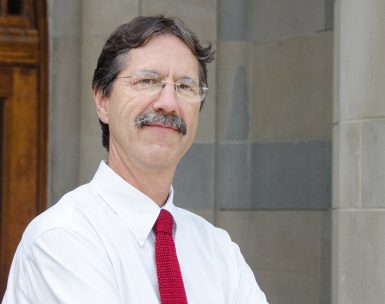Kelly discusses photojournalists’ ethical decisions

Journalists must decide: humanity or professionalism first?
Media School associate professor Jim Kelly discussed public assessments of photojournalists’ ethical decisions Tuesday afternoon during a roundtable at the IU Poynter Center for the Study of Ethics and American Institutions.
Kelly, who has been with the IU journalism program since 2007, presented research he conducted with University of Kentucky associate professor Yung Soo Kim. The research focused on the public perception of photojournalists’ ethical responsibility to aid those in traumatic situations.
“Every photographer faces this ethic of being a reporter first, or being what is called a ‘human being,’” said Kelly.
Kim had faced public criticism in the ‘90s after taking photos of a woman setting herself on fire and then jumping from a bridge in South Korea as a form of political protest. Kelly and other researchers have attempted to answer the question of “Should a photographer help?”
The answer, like many answers to ethical dilemmas, is “it depends.”
After conducting a study of 72 participants who had never seen the photos of the woman self-immolating, Kelly and Kim found three conditions in which the public believed the photographer should do his or her professional duty.
Political speech seemed to be a key factor in the audience’s opinion of whether or not the journalist acted appropriately. There was a significant statistical difference between the event being viewed as an accident versus an intentional sacrifice as a form of free speech.
Second, they found that the ability of that journalist to help the victim determined right from wrong. One of the photographs shown to the treatment group was from the perspective of the bridge, 30 feet above the scene, while the other was from a street level point of view where the victim was easily accessible.
Last, when other witnesses were present, the audience generally agreed that it was not the journalist’s responsibility to help and could continue on with his or her professional objectives.
“We’ve always admitted that human beings affect other human beings behaviors,” said Kelly.
Attendees of the roundtable also discussed Kevin Carter’s Pulitzer Prize-winning photo of a starving child in Sudan while a nearby vulture appears to wait nearby, and the ethical implications of intervening in that situation. A paper by Kelly and Kim on this case was published in a 2013 issue of Visual Communications Quarterly.
A question that continuously arose at the discussion is whether or not the photo is likely to make a difference in a particular situation.
“People are more willing to allow the largely professional photographers who have bigger voices more leeway,” said Kelly.
Journalism senior Michael Homan asked about the effect of citizen journalism on the public perceptions of an ethical media. Kelly said that he did not know, but time would tell.
“I thought it was very thought provoking and the kind of discussion everyone should be having whether they are in journalism or not,” said Homan.
Talks concluded with the thought that journalists must hold other journalists to an ethical standard. There is an assumed universal journalistic ethic of truth telling that professionals must abide by to report the news.
“I’ve always had great faith in the ability of people to do right in the end,” Kelly said. “There are good people out there.”

